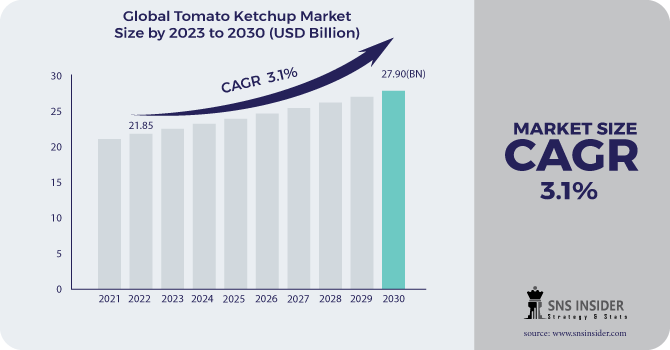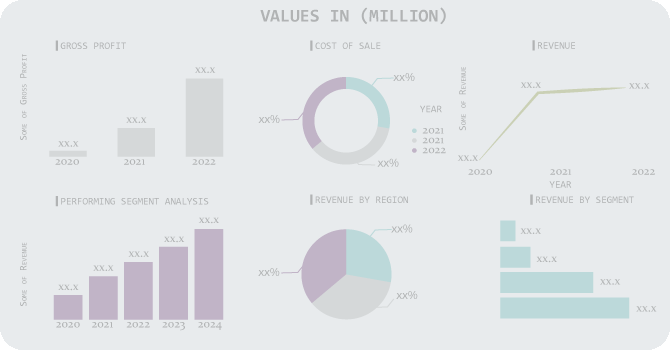Tomato Ketchup Market Report Scope & Overview:
Tomato Ketchup Market Size was valued at USD 21.85 billion in 2022 and is expected to reach USD 27.90 billion by 2030, and grow at a CAGR of 3.1% over the forecast period 2023-2030.
Ketchup, or table sauce, alludes to a cool fixing fabricated from delicate red tomatoes that can be eaten with both hot and cold food items. It has a sweet and tart flavor and is frequently utilized with tidbits and canapés to upgrade the kind of dish. Ketchup is ready by mixing ready whitened tomatoes with vinegar, sugar, and different flavors and spices. The vinegar goes about as a safeguarding specialist and the sugar helps with dealing with the tartness of the sauce. Ketchup likewise incorporates onion, allspice, coriander, clove, cumin, garlic, mustard, salt, and extra normal and fake sugars to improve the kind of result.

It is regularly served as an afterthought with sandwiches, burgers, fries, and barbecued or broiled meat in homes, eateries, bistros, and speedy serving cafés (QSRs) and is likewise utilized as a base sauce for different curries and soups. It works on the general flavor and consistency of the dish and is likewise a rich wellspring of fundamental cell reinforcements, nutrients, and lycopene that have different medical advantages. Ketchup is right now accessible in customary and enhanced variations, which are put away and conveyed in pockets and plastic and glass bottles.
Market Dynamics:
Driving Factors:
-
Rising Popularity of Ready-to-Eat (RTE) Food Products.
-
Moving Preference Toward Organic Product Variants.
Restraining Factors:
-
The reimposition of lockdowns.
Opportunities:
-
Multiplying Online Retail Channels and Aggressive Promotional Activities.
Challenges:
- Wellbeing hitches related to the abuse of ketchup.
Impact of Covid-19:
The lockdown declared during the COVID-19 pandemic had upset transportation and suspended the stockpile of natural substances like tomatoes for a brief-term, subsequently essentially influencing the product and import of the market across the globe. The rising interest in inexpensive food and prepared-to-eat items after the COVID pandemic will set out open doors for the market players. Accordingly, the market is supposed to observe sound development in the forthcoming years.
Market Estimations:
By Application:
The Tomato Ketchup Market given the application type can be additionally portioned into cleaning pans, beauty care products, family food sources, and modern/business. The family fragment held the biggest offer in 2021. The development is inferable from changing dietary patterns of individuals ascribed to begrudge toward the western way of living. Most individuals in agricultural nations aimlessly follow the things moving in western countries. Additionally, as the interest in prepared-to-eat (RTE) food sources is heightening the prominence and utilization of ketchup are plunging vertically.
By Distribution channel:
The Tomato Ketchup Market’s given circulation channels can be additionally fragmented into disconnected (stores/hypermarkets, odds and ends shops, little retail locations, others), and Online Platforms. The disconnected portion held the biggest offer in 2021. The development is inferable from the sweeping presence of disconnected stages like retail shops. Not at all like present-day retail outlets and online stages, little retail outlets have an enormous presence in peaceful regions. Individuals make each vital and required buy from that point just which is the excellent purpose for the development in the separate fragment.
Key Market Segmentation:
By Type:
-
Flavored
-
Regular
-
Others
By Packaging:
-
Pouch
-
Bottle
-
Others
By Distribution Channel:
-
Supermarkets and Hypermarkets
-
Convenience Stores
-
Online Stores
-
Others
By Application:
-
Household
-
Commercial
-
Others
.png)
Regional Analysis:
-
North America
-
USA
-
Canada
-
Mexico
-
-
Europe
-
Germany
-
UK
-
France
-
Italy
-
Spain
-
The Netherlands
-
Rest of Europe
-
-
Asia-Pacific
-
Japan
-
south Korea
-
China
-
India
-
Australia
-
Rest of Asia-Pacific
-
-
The Middle East & Africa
-
Israel
-
UAE
-
South Africa
-
Rest of Middle East & Africa
-
-
Latin America
-
Brazil
-
Argentina
-
Rest of Latin America
-
North America overwhelms the ketchup market in light of the event of some cheap food joints and QSRs, combined with the inclination of colossal people base for variations of ketchup. Asia-Pacific is assessed to fill in the conjecture time of 2020-2027 because of the developing utilization of cheap food, expanding westernization, and tendency towards a few kinds of ketchup.
The nation part of the ketchup market report likewise gives individual market affecting elements and changes in the guideline in the market locally that influences the current and future patterns of the market. Likewise, the presence and accessibility of worldwide brands and their moves looked because of enormous or scant rivalry between the neighborhood and homegrown brands, the effect of homegrown levies and shipping lanes are considered while giving conjecture examination of the nation information.
Key Players:
Bolton Group S.r.l., Campbell Soup Company, Conagra Brands Inc, Del Monte Food Inc., General Mills Inc., Lee Kum Kee Company Limited, Nestlé S.A., Premier Foods plc, Sky Valley & Organicville (Litehouse Inc.), Tate & Lyle plc, The Kraft Heinz Company and Unilever Plc.
Conagra Brands Inc-Company Financial Analysis

| Report Attributes | Details |
|---|---|
| Market Size in 2022 | US$ 21.85 Billion |
| Market Size by 2030 | US$ 27.90 Billion |
| CAGR | CAGR 3.1% From 2023 to 2030 |
| Base Year | 2022 |
| Forecast Period | 2023-2030 |
| Historical Data | 2020-2021 |
| Report Scope & Coverage | Market Size, Segments Analysis, Competitive Landscape, Regional Analysis, DROC & SWOT Analysis, Forecast Outlook |
| Key Segments | • by Product Type (Regular Ketchup and Flavored Ketchup), Packaging (Bottled and Pouch) • by Distribution Channel (On-trade, and Off-trade) |
| Regional Analysis/Coverage | North America (USA, Canada, Mexico), Europe (Germany, UK, France, Italy, Spain, Netherlands, Rest of Europe), Asia-Pacific (Japan, South Korea, China, India, Australia, Rest of Asia-Pacific), The Middle East & Africa (Israel, +D11UAE, South Africa, Rest of Middle East & Africa), Latin America (Brazil, Argentina, Rest of Latin America) |
| Company Profiles | Bolton Group S.r.l., Campbell Soup Company, Conagra Brands Inc, Del Monte Food Inc., General Mills Inc., Lee Kum Kee Company Limited, Nestlé S.A., Premier Foods plc, Sky Valley & Organicville (Litehouse Inc.), Tate & Lyle plc, The Kraft Heinz Company and Unilever Plc. |
| Key Drivers | •Rising Popularity of Ready-to-Eat (RTE) Food Products. •Moving Preference Toward Organic Product Variants. |
| Market Restraints | •The reimposition of lockdowns. |

